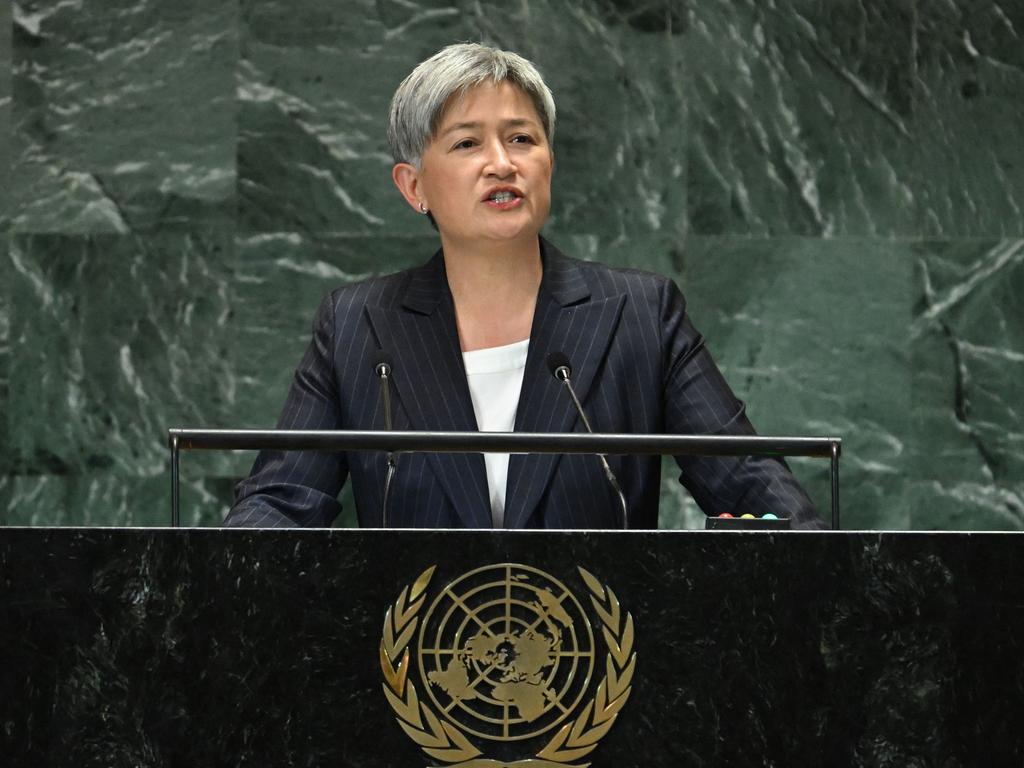Australia/Israel Review
UNGA pains
Dec 17, 2024 | Allon Lee

The claimed motivation for the Albanese Government’s decision to change Australia’s stance on a number of the anti-Israel resolutions the United Nations General Assembly (UNGA) votes on every November and December is ostensibly to advance the creation of a Palestinian state.
However, a closer analysis of the resolutions’ text reveals that they are likely to have exactly the opposite result – emboldening the Palestinian Authority (PA) to believe it can win a state without the need to negotiate with Israel.
On November 14, Australia departed from a long-standing bipartisan stance on two anti-Israel resolutions that concern resources and the environment.
The decision to change Australia’s vote from “no” to “yes” on the resolution – “Oil Slick on Lebanese Shores” – appears entirely gratuitous.
This resolution belongs to the UN’s Sustainable Development agenda. Israel is the only country that the UN ever singles out for condemnation under this agenda.
This one-sided resolution, first introduced in 2006, demands Israel pay compensation for ecological damage caused by the Israeli Air Force damaging oil storage tanks during that year’s Lebanon war.
Until 2024, all Australian governments, including the first two years of the current Federal Government and the 2007-2013 Rudd-Gillard Labor Government, voted “no”.
The reasoning for Australia’s hitherto principled stance of opposing this resolution is obvious.
The resolution one-sidedly ignores Hezbollah’s culpability for starting the conflict and its responsibility for causing environmental destruction in Israel’s north, including the loss of 500,000 trees due to fire.
The Australian Government’s argument that supporting this one-sided and obsolete resolution advances the cause of peace appears obviously baseless – “Oil Slick on Lebanese Shores” has zero connection to the Israeli-Palestinian conflict.
The second resolution – “Permanent sovereignty of the Palestinian people in the Occupied Palestinian Territory, including East Jerusalem, and of the Arab population in the occupied Syrian Golan over their natural resources” – accuses Israel of “widespread destruction” in the West Bank and Gaza.
This includes alleged damage to “Vital infrastructure… water pipelines, sewage networks and electricity networks… in particular in the Gaza Strip… [that] has polluted the environment and which negatively affects the… water and sanitation systems… the water supply and other natural resources of the Palestinian people.”
The resolution falsely accuses Israel of preventing the construction of sewage treatment plants, water pipes and desalination projects in Gaza even though Israel has had no direct role in Gaza’s governance since 2005.
And it ignores how poor governance by Hamas and the Palestinian Authority in Gaza and the West Bank respectively is the main cause of environmental degradation in those areas.
Significantly, the resolution also overlooks the environmental damage Hamas has caused in Israel, including in 2018 when it sent incendiary balloons across the border triggering bushfires and creating horrendous air pollution by burning tyres to create smokescreens.
The resolution further ignores the fact that under the terms of the Oslo Accords signed by Israel and the Palestinian Liberation Organisation (PLO) in 1993, Israel is legally entitled to administer those areas of the West Bank which are under its jurisdiction, primarily Area C. Foreign Minister Senator Penny Wong reportedly ignored advice from the Australian UN mission to abstain.
On Dec. 3, Australia changed its votes on three more UNGA resolutions.
The most problematic resolution was “Peaceful settlement of the question of Palestine.”
The last time Australia voted “yes” to this resolution was in 2002.
The 2024 iteration of the “Peaceful settlement” resolution was double the length in comparison to the last time we voted yes in 2002, and much more extreme.
Explaining why Australia decided to vote “yes”, Australia’s Ambassador to the UN, James Larsen, said the resolution doesn’t pre-judge the outcome of Israeli-Palestinian negotiations.
But the resolution absolutely does pre-judge the outcome of negotiations. It demands a full unilateral Israeli withdrawal from the West Bank and east Jerusalem as soon as possible – plus that Israel pay reparations to Palestinians.
The resolution makes no demands of the PA, such as cessation of incitement to terrorism or the “pay for slay” scheme that financially rewards acts of terror. And it pretends Hamas does not exist.
This motion does nothing to acknowledge that the PA has rejected generous and substantive Israeli offers to create a Palestinian state that would resolve many of the demands made of Israel in this motion, including the Palestinian refugee issue.
The resolution’s demand for total and unilateral Israeli withdrawal from both the West Bank and east Jerusalem undermines the principle of land swaps that has been central to all peace plans over the last few decades. It further indulges in appalling moral equivalence, equating terror attacks by Palestinians with Israel’s counterterrorism responses to those attacks. It even calls for the release of Palestinian prisoners who committed acts of terrorism, but not Israeli hostages kidnapped on October 7.
The resolution this year added a new proposal that a conference be held in June 2025 that will produce a document that will “urgently chart an irreversible pathway” to a two-state solution – a conference sure to be heavily stacked in favour of the PA, and likely to provide an additional excuse to continue avoiding bilateral negotiations.
The second resolution considered on Dec. 3 was the “Division for Palestinian Rights of the Secretariat.” Between 2004 and 2022, Australia always voted no on this resolution, but this year it abstained. The Division for Palestinian Rights is a subdivision of the UN Secretariat’s Department of Political Affairs that plays a critical role in the anti-Israel machinery that dominates all elements of the UN bureaucracy.
Essentially, it is the UN’s dedicated propaganda department on behalf of the Palestinian national cause, constantly issuing publications and organising events. Some of those events and publications effectively devolve into calls for Israel’s destruction, or support for anti-Israel terrorism.
The third resolution Australia voted to change its position on was “The risk of nuclear proliferation in the Middle East.”
Between 2001 and 2022, all Australian governments voted to abstain on this resolution, but last year, we shifted to yes. However, this year the Government returned to abstaining for unexplained reasons.
The Australian Government is aware that these resolutions are fundamentally flawed. Indeed, every time Australia has supported anti-Israel resolutions that have come up for consideration since October 7, Foreign Minister Penny Wong admits as much, even as she orders our diplomats to vote for them anyway.
Frustratingly, the Government has preferred to falsely spin these dramatic and counter-productive changes in our UN votes as a reversion to past bipartisan policy, citing past votes decades ago on very different versions of these resolutions under totally different circumstances. Or else insist we are simply following the international “consensus”. These manoeuvres are no substitute for actually explaining how in the world supporting one-sided resolutions that clearly do not reflect reality can possibly encourage a peaceful resolution to the Israel-Palestinian conflict.






